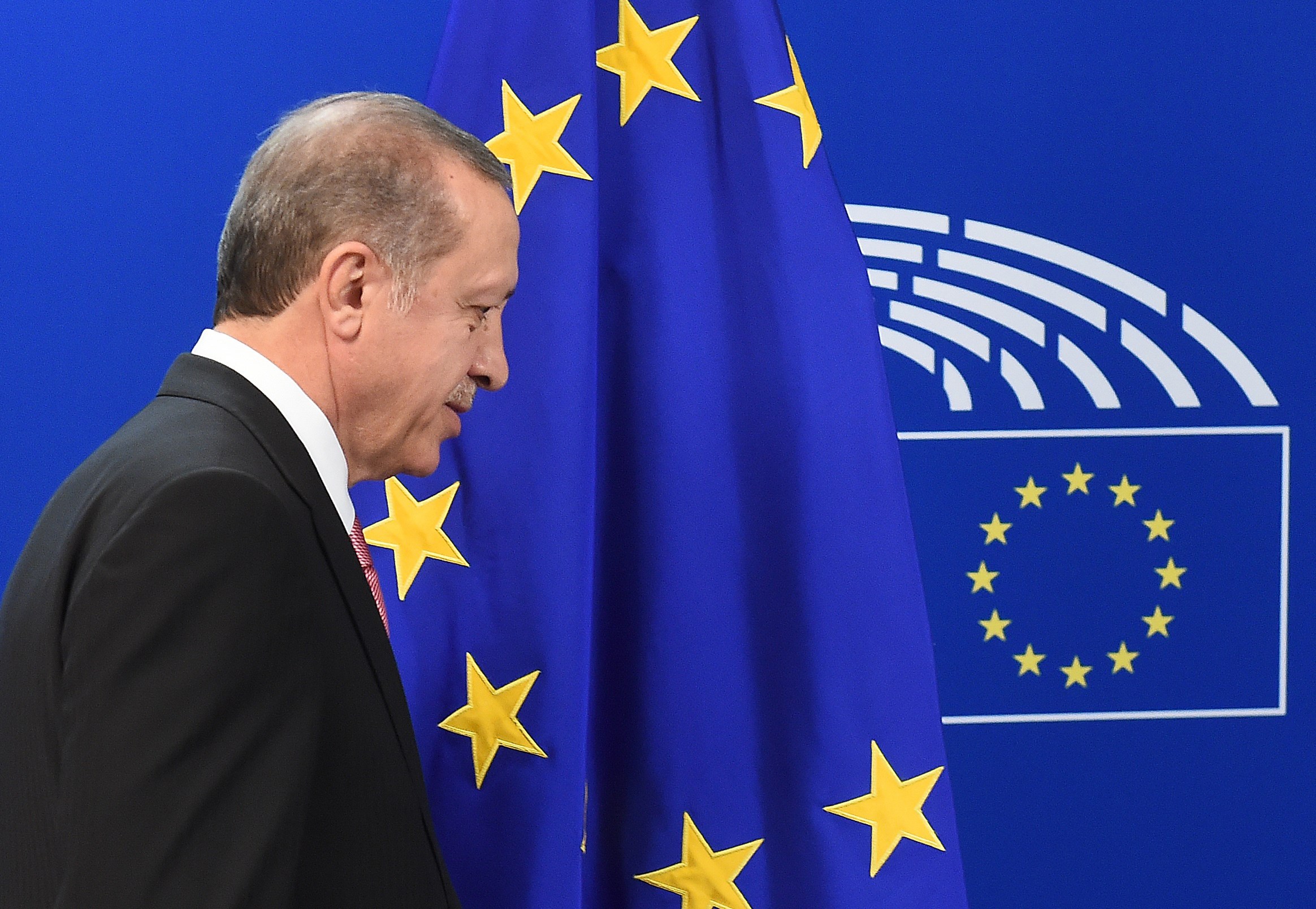Erdogan, many Disagreements and bargains with the European Union!
European Center for Counterterrorism and Intelligence Studies in Germany and Netherlands.
Turkey’s attempts to join the European Union date back to 1959, and this resulted in the Ankara Agreement in 1963, which envisioned gradual accession of Turkey to the European Customs Union. Turkey submitted an application in 1987 to join what was called the European Economic Union (EEU) and was classified by the European Union in 1997 as eligible to join it, but negotiations did not actually begin until 2005.
Turkey’s attempts to join the European Union have stalled due to several reasons, including:
Disagreements with EU on refugee agreement
According to “DW” on January 2, 2020, The agreement obliges Turkey to stop asylum-seekers from departing from its territory for nearby Greek islands with the help of people smugglers. In return, up until 2018 the EU provided €6 billion to improve the living conditions of Turkey-based refugees. The deal also envisions that migrants who are not entitled to asylum in Europe will be deported from Greek islands back to Turkey. The EU has promised to take in one Turkey-based Syrian refugee for every refugee deported from Greece. The EU has also pledged to begin talks about scrapping visa requirements for Turkish citizens visiting the bloc and about Turkey’s prospective EU membership.
According to “France 24” on September 5, 2019. Turkish President Recep Tayyip Erdogan threatened to open the gates for millions of refugees eager to flee to Europe unless more international support was provided, especially the European Union. More than 3.6 million Syrian refugees are currently in Turkey, which recently demanded to establish the “safe zone” in northeastern Syria, to which refugees could return.
Disagreements with EU on drilling in the eastern Mediterranean
On January 1, 2020, according to “Monte Carlo”, the Turkish Foreign Ministry announced that the Turkish drillship “Yavuz” arrived in waters off southwest of Cyprus where it
Will begin drilling for oil and gas, and said in a statement that “The Turkish Cypriots have rights on this field… as much as the Greek Cypriots”. “The two sides will share the income if oil or natural gas are found there.”
For its part, Cyprus accused Turkey of “turning into a pirate state in the eastern Mediterranean,” the presidency said in a statement. “Turkey insists on going down the path of international illegality it has chosen,” it said.
According to Sky News Arabia, on November 15, 2019, Turkey confirmed that The Turkish oil-and-gas drilling ship Fatih has started its operations off the coast of northeastern Cyprus, despite warnings from European Union for Ankara to stand down. Turkish vice president Fuat Oktay said that “The Turkish oil-and-gas drilling ship Fatih has started its operations off the coast of northeastern Cyprus“. It is noteworthy that there is another Turkish drillship, Yavuz, is off the west coast of Cyprus.
Disagreements with EU on Libya
According to “Russia Today” on January 18, 2020. The Turkish president, Recep Tayyip Erdoğan, has warned Europe it could face new threats if Libya’s GNA government led by Fayez al-Sarraj were to fall. “Terrorism will find fertile soil if the Al-Sarraj government falls”. And “Terrorist organizations such as ISIS and al-Qaeda, which suffered a military defeat in Syria and Iraq, will find a foothold in Europe”.
On January 3, 2020, the European Union expressed its “deep concern” over Turkey’s decision to intervene militarily in Libya, after the Turkish parliament approved a draft law authorizing Turkish presidency to send troops to Libya to support the GNA government led by Faiz al-Sarraj in the face of the attack of the Libyan National Army led by Field Marshal Khalifa Hifter on the capital, Tripoli. A European Union spokesman said: “There is no military solution to the Libyan crisis. The procedures that support those fighting in the conflict will further destabilize the country and the whole region.
Disagreements on Schengen and human rights
On May 29, 2019, the European Union said that the Turkish judicial system witnessed “a further serious backsliding”, directing sharp criticism of the country on a number of issues, starting with human rights and ending with economic policies. The European Union considered that Turkey continues to distance itself from the European bloc and its values. The European Commission considered that Turkey’s hopes of joining the European Union are fading. The commission added that Turkey’s candidacy to join the world’s largest trading group is frozen because of “further serious backsliding” on human rights and judicial independence. “Negotiations have … effectively come to a standstill,” the Commission said of Turkey.
EU aid cut to Turkey
According to “Euronews” on January 19, 2020. EU foreign affairs spokesman Peter Stano said in a statement that “The intention by Turkey to launch further exploration and drilling activities in the wider region goes, regrettably, in the opposite direction”. EU announced that The framework “will make it possible to sanction individuals or entities responsible for or involved in unauthorized drilling activities of hydrocarbons in the Eastern Mediterranean.” A list of names may be put on the table during the meeting of European foreign ministers. The sanctions will consist of a travel ban to the EU and an asset freeze for persons, and an asset freeze for entities. In addition, EU persons and entities will be forbidden from making funds available to those listed.
The EU has cut pre-accession aid to Turkey by 75%, according to a letter sent to the European Parliament by EU foreign affairs commissioner Josep Borrell. According to Funke Media Group on January 18, 2020.
Borrell justified the new cut by saying it was in response to Turkey’s decision to stage a military operation in northeastern Syria in October 2019, and conduct unauthorized gas drilling off the coast of Cyprus.
The cut in aid, however, doesn’t affect the aid provided by the bloc for the Refugee Agreement. so that the cut of aid for the current year will be (75%).
According to the European Commission statements, Turkey will now only receive €168 million, of which €150 million will be spent on strengthening democracy and rule of law. The rest (€18 million) is earmarked for rural development.
Conclusion
Ankara still threatens regional and international stability and security by choosing an irreversible going against international legitimacy, as well as the provocative actions practiced by Ankara, both internally in Turkey and abroad towards the EU countries that will make the European Union rejecting Turkey’s accession to the EU, especially after the European Parliament suspended Turkey’s accession talks to the European Union.
The Turkish harassment of energy reserves in the eastern Mediterranean is not new; but this time it is more of international and regional concern, especially after the signing of a memorandum of understanding to demarcate the maritime borders with the Saraj government, that would lead to the escalation of regional tension in the region and lead to fueling the conflict in Libya.
As usual, Erdogan used the method of blackmail and threatening with the Europeans, especially with regard to the immigration crisis and terrorism as a pressure card on European countries to support him in achieving his regional ambitions, as happened during the military operation in northern Syria and currently in the Libyan crisis, and what perhaps helps him in this is the continuity of Europe without a unified asylum policy, without which, the EU countries can’t stand against these Erdogan’s threats.
Therefore, the Europeans should accept greater responsibility towards refugees, as well as imposing economic sanctions against Turkey and the cessation of arms sales from the EU governments. Turkey must abide by the foundations and rules of international law and respecting the sovereign rights of Cyprus in the Mediterranean Sea.
Copyright reserved to the European Center for Counterterrorism and Intelligence Studies




